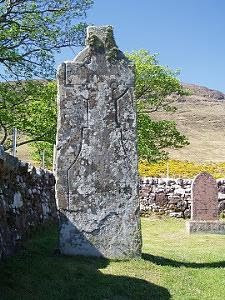 I'm thinking of Irish saints today with St Patrick's day being yesterday. This article is about Maelrubha a little known missionary and saint, but nevertheless one of my favourite heroes.I first heard about him from an old Scottish Presbyterian minister from Aberdeen called William Still who used to come over to Bangor Co.Down each year in the 1970's to preach to a group of young people.At his Swansong he said he was repaying part of the debt SCotland owed to Maelrubha.William Still was a humble man and a great preacher whose works can still be purchased and are highly recommended. Maelrubha, like Patrick and Columba before him was a fearless man and having left his native Ireland was to give his life to the preaching of the gospel in the wild and rugged highlands of Scotland. May God raise up many more men like him and bring revival and reformation to to these islands again!AK
I'm thinking of Irish saints today with St Patrick's day being yesterday. This article is about Maelrubha a little known missionary and saint, but nevertheless one of my favourite heroes.I first heard about him from an old Scottish Presbyterian minister from Aberdeen called William Still who used to come over to Bangor Co.Down each year in the 1970's to preach to a group of young people.At his Swansong he said he was repaying part of the debt SCotland owed to Maelrubha.William Still was a humble man and a great preacher whose works can still be purchased and are highly recommended. Maelrubha, like Patrick and Columba before him was a fearless man and having left his native Ireland was to give his life to the preaching of the gospel in the wild and rugged highlands of Scotland. May God raise up many more men like him and bring revival and reformation to to these islands again!AK What Colmcille and Moluag accomplished in Ancient Scotland in the sixth century, Maelrubha rivalled in the seventh with a final great flowering of the Celtic Church before the Vikings. Mealrubha was of princely Niall lineage on this father's side, and through his mother was of Comgall's race of Irish Picts. He went to the monastery Comgall had founded for his education to the priesthood. His mission at Applecross, like Moluag's was an offshoot of Bangor.
The saint's Applecross brethren ranged widely over both Pictland and Scottish Dalriada, and Maelrubha's name is recorded in place names scattered over the length and breadth of Scotland. He won great fresh extensions of the Celtic territory, all of the rugged , almost inaccessible western seaboard between Loch Carron and Loch Broom, the south and west parts of the Isle of Skye and eastern Ross. Twenty-one known parishes were dedicated to Maelrubha under such forms of his name as Maree, Mulruby, Mary, Murry, Summuruff, Summereve. For fifty years he tramped the high roads and the low roads with such a reputation for sanctity and miracles he was regarded as the patron Saint throughout all of that territory. To the north of Applecross in the long narrow scenic Loch Maree is Maelrubha's little island, Inis Maree, "the favoured isle of the saint." On it besides his oratory and a cemetery was his holy well, a spring "of power unspeakable" in cases of insanity. It was famous until very recent times for the cures obtained there. He is still invoked for mental illness in Scotland.
Scottish legend makes Maelrubha a martyr at the hands of the Norse pirates and the parish church at Urquhart is said to occupy the site of the chapel first built to mark the spot where he died. A mound outside Applecross, Cloadh Maree, is pointed out as his grave. Within a radius of six miles of this the area was accorded all rights and privileges of sanctuary.
Irish abbots continued at Applecross for a while. In 737 Failbhe, "Comharb of Maelrubha," perished with twenty-two of his religious at sea.
The annals of Ulster enter the death of 'MacOigi of Aporcrossan" in 801. Memory of Maelrubha seems to have survived a long time. In the time of clan warfare, when one of the MacDonald partisans in the feud with the MacKinsies in the seventeenth century was told it was a sacrilege to kill a MacKinsie within Maelrubha's sanctuary, MacDonald replied it was no sin to kill a MacKinsie wherever they might be found.
No comments:
Post a Comment